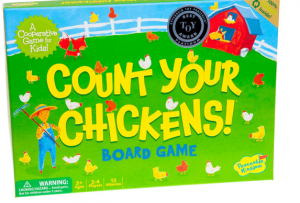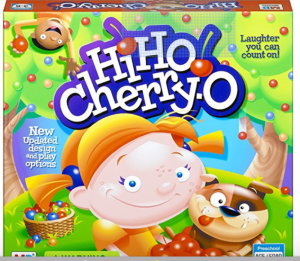Playing Games
When playing games, preschool children typically believe that there will be a winner and a loser at the end of the game. I often hear the phrases “I win!” or “You lose!!” when observing children involved in a multiple-player game. The competitiveness and desire to “be the winner” can overshadow the objectives of playing the game. 
Developmentally, young children are at a stage where playing competitive games will create conflict among players. It often takes an adult or more knowledgable other to provide appropriate guidance. Helping children to stay focused on the objectives of the game and assisting them in taking turns and playing fairly are some of the tasks adults should take on when working with young children involved in playing games.
Instead of competitive games, parents and teachers can use cooperative games to teach math, science and other content areas without the social emotional conflict of having a winner or loser. Cooperative games are suited for children at multiple developmental ages and stages. Cooperative games often include all players working together to reach the final goal. Many children enjoy playing cooperative games because they eliminate the emotional “winner” and “loser” aspect of competitive games.
Using cooperative games to help teach mathematical concepts to young children is a fun way for them to develop simple to complex mathematical thinking and skills. These games can help to introduce and reinforce different math concepts such as number recognition, composing and decomposing, and 1-to-1 correspondence. The games can start simple —the child moves the game piece the number stated on the rolled die– to more complex such as addition and subtraction.
Some examples of cooperative games that are great for teaching early math concepts are Count your Chickens, Mermaid Island, and Hi-Ho Cherry-O. These games help develop math skills, social/emotional skills and problem solving techniques in a non-stressful environment. 
Count your Chickens is a fun game that helps children learn counting, by having them spin the spinner and then moving the correct number of spaces to collect that number of chickens. This game can be played with preschoolers as early as age three. Once children begin to master a game, they will continue to enjoy the game until they are ready to move to a more complex game. These types of games promote positive self esteem among young children, which assists in motivating them to take on more challenging concepts.
In the classroom, a teacher can set up the environment for the children to participate in a cooperative game by introducing the game at large group time. Then, the teacher can create a sign up system for the children. Children are going to be eager to participate in the new game, so you may have lots of children wanting to participate. Make sure that all of the children understand that they will eventually have a turn playing the game. Once the children have mastered the game, the teacher or parent can remove themselves as participants, observing the children.
Teachers and parents can use cooperative games to introduce and develop basic to complex concepts in all subjects. Games are a fun way to encourage patience, turn taking, math, science, literacy and so much more.
Cooperative Games I agree is an excellent and more fun way for all children to enjoy the game not worry about who won or who lost. Usually when kids are playing a board game they tend to either argue or fight instead of each taking turns and taking their time learning how to play it. But your concept and cooperative game ideas and suggestions are very helpful.
I think the idea of using cooperative play vs comparative play is good thinking. We have been so conformed to competing with one another we forgot it takes each individuals gifts and talents being used in collective for the good of us all. Teaching children to cooperate with one another than compete with one another they learn togetherness and how to be helpful to one another.
I loved your concept in this blog. The vast majority of the children love to check, sort, perplexes, and find designs yet when it turns out to be hard and disappointing for the children. You can discover huge amounts of applications on the web which can assist your child with clearing the math ideas. But Eye Level Bolingbrook Develop critical thinking skills and problem-solving skills.